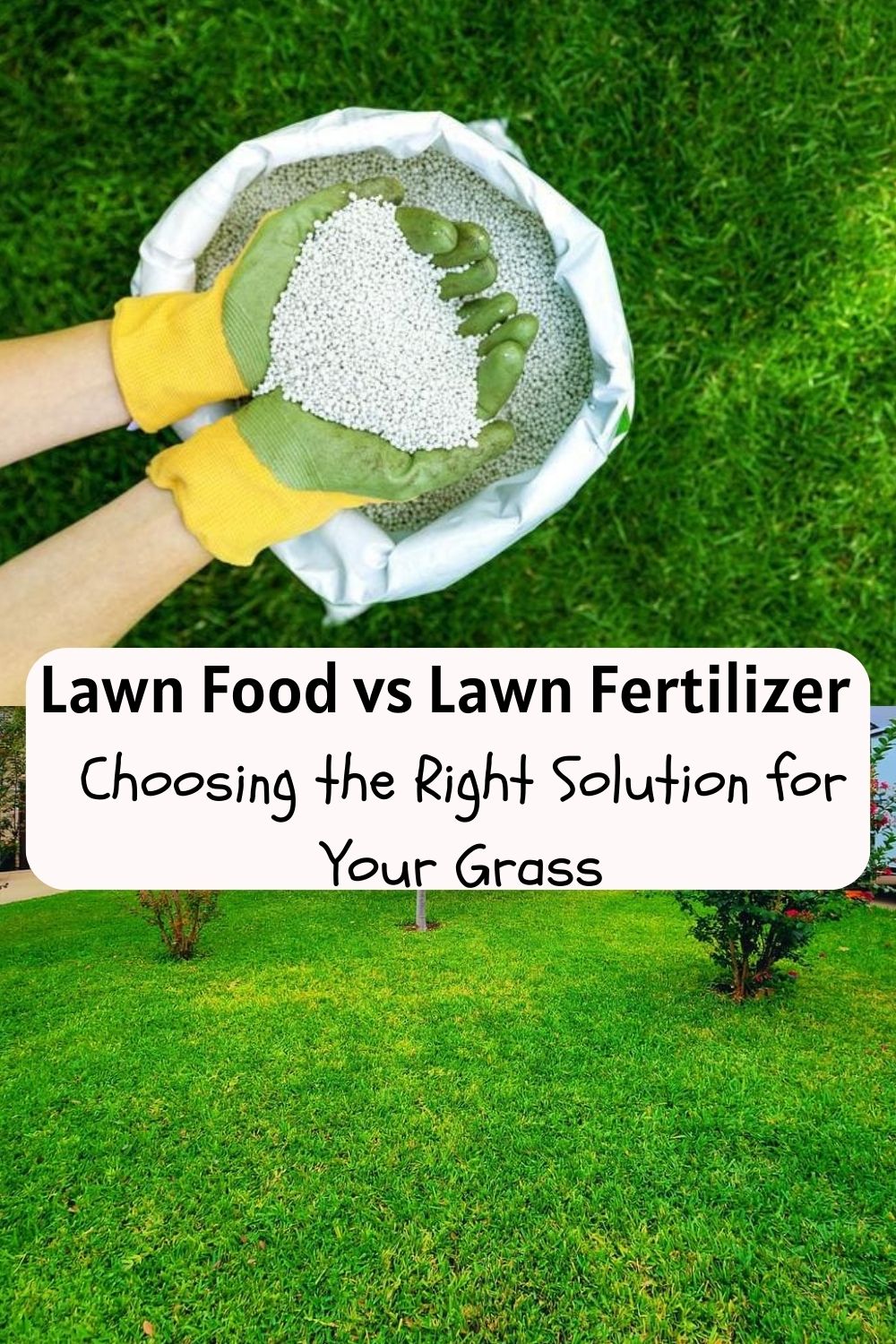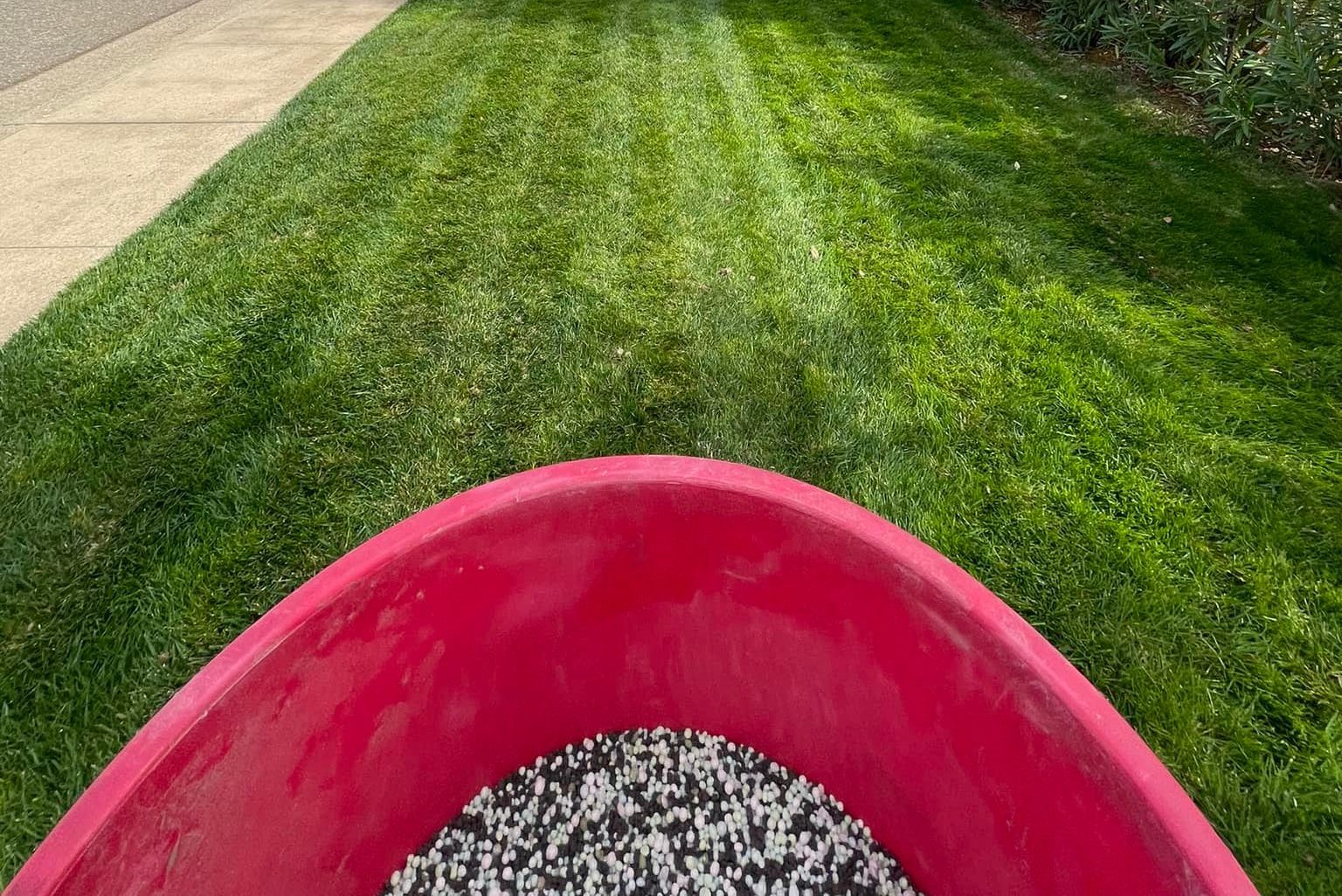In your pursuit to give your grass the boost it needs to thrive, you’ll come across bags labeled “Lawn Food” as well as those labeled “Lawn Fertilizer.” This leaves you asking: what the difference between these products is. Also, more importantly, which one suits your lawn?
Lawn fertilizer and lawn food are usually used synonymously. However, this doesn’t mean they mean the same thing, but they both play a vital role in establishing a healthy, vibrant lawn. So, what is the difference between “Lawn Food” and “Lawn Fertilizer?”
Keep reading to uncover their differences, how they compare, and when to use them.
Lawn Food vs Lawn Fertilizer
What Is Lawn Food?
Lawn food refers to a broader that encompasses natural and supplemental nutrients necessary for improving and maintaining a lawn’s health. It includes fertilizers, microbial inoculants, soil conditioners, and weed control agents.
Organic materials like grass clippings, decomposing leaves, and compost are natural forms of lawn food. They help replenish soil nutrients.
Lawn food feeds the grass, aiding processes like enzyme activity and chlorophyll generation. It also supports beneficial microorganisms and enriches the soil.
Soil conditioners boost soil structure, thus letting the roots grow deeper and facilitating better access to nutrients. On the other hand, microbial inoculants enrich the soil with beneficial microorganisms that break down organic matter into nutrients.
Certain lawn foods have weed control agents that help your lawn fight unwanted plants, thus ensuring your grass faces less competition.
Related Posts:
- Best Homemade Fertilizers For Lawn
- Things You Should Never Do To Your Lawn
- Topdressing Your Lawn: Benefits And How To Do It Correctly
Benefits of Lawn Food
Below are the different ways lawn food is beneficial to your lawn.
a) Promotes Long-Term Lawn Health
Lawn food enhances soil quality by ensuring it retains nutrients and moisture more efficiently. It also feeds the soil with beneficial microbes and adds organic matter.
Lawn food releases nutrients gradually, thus ensuring prolonged nourishment. This results in consistent and lush grass growth over a long period.
With lawn food, your lawn will support grass growth for a long time without constant supplementation.
b) Soil Enrichment
Aside from nourishing your grass, lawn food boosts soil quality. The microbes and organic matter in lawn food aid in root penetration, soil structure, and drainage.
c) Environmentally Friendly
Lawn food provides an eco-friendly way of enriching your lawn, as most lawn food formulas feature natural elements and organic materials. Lawn foods minimize chemical runoff and pollution, which helps create a healthier ecosystem for animals, beneficial organisms, and plants.
d) Stress Resistance
A nutrient-rich, healthy lawn is better equipped to fend off pests, heatwaves, heavy foot traffic, and diseases, among other stressors. Lawn foods help lawns retain their health and vibrancy even when under stress.
e) Promotes Weed Suppression
Feeding your lawn organic lawn food makes it grow thick, leaving little room for weeds to grow. A dense lawn also shades out weed seedlings, making them die off before maturing.
What Is Lawn Fertilizer?
Lawn fertilizers are products containing nutrients essential for grass growth, health, and color. Fertilizers typically contain three key macronutrients: nitrogen (N), phosphorus (P), and potassium (K). In addition, they contain micronutrients like iron, magnesium, and zinc.
Synthetic fertilizers are made from inorganic compounds such as phosphate minerals, atmospheric nitrogen, and ammonia. Manufacturing involves human-controlled chemical processes such as the Haber-Bosch Process, potash mining and refining, and phosphoric acid production.
Synthetic fertilizers are in granular forms which are easy to apply and quick-release and liquid forms which are slow-release and packed with more key nutrients than liquid fertilizers.
Organic fertilizers come from natural materials such as plants, minerals, and animals. Plant-based ingredients for making organic fertilizers include yard waste, seaweed, plant residues, alfalfa meal, and food scraps.
Animal-based ingredients comprise manure, bone meal, and feather meal. On the other hand, mineral-based ingredients include lime, rock phosphate, sulfur, and greensand.
Synthetic fertilizers give lawns a quick nutrient burst because the nutrients are available for immediate uptake. In contrast, organic fertilizers release nutrients gradually.
Benefits of Lawn Fertilizer
Here are the key benefits of fertilizers on lawns.
i) Improves Grass Color and Growth
If you fertilize your lawn regularly, the grass will develop a good color and grow lush and thick. Nitrogen, in particular, promotes chlorophyll production, responsible for that vibrant green grass color. It also stimulates leaf growth.
ii) Boosts Disease and Pest Resistance
Fertilized grass is stronger and less vulnerable to diseases and pests. Therefore, you’ll hardly need chemical treatments to tackle these stressors.
iii) Saves Your Time and Money
Since fertilizing encourages grass to develop strong roots that efficiently absorb water, your lawn will need less watering if well-fertilized. In addition, thick, healthy grass is less susceptible to damage, so you won’t have to spend money frequently and sacrifice your time repairing your lawn.
iv) Promotes Quicker Recovery
The nutrients found in fertilizers help the grass recover more effectively and quickly from pests, extreme weather, diseases, or foot traffic. For instance, nitrogen-rich fertilizers stimulate growth in damaged or patchy sections.
v) Weed Suppression
Lawn fertilizers stimulate vigorous growth in the grass, helping create a dense, lush carpet without gaps. Weeds are less likely to invade a healthy lawn.
Lawn Food vs Lawn Fertilizer: Comparison
Before you decide whether to use lawn food or lawn fertilizer to nourish your lawn, understanding their differences helps. For that reason, below is how lawn foods and lawn fertilizers compare.
1) Nutrient Composition
Lawn fertilizers typically contain an organic or synthetic blend of concentrated doses of essential nutrients, primarily nitrogen, phosphorus, and potassium. On the other hand, lawn foods comprise a diverse mixture of components, including external supplements and organic matter.
2) Speed of Results
Lawn fertilizers, especially synthetic formulas, provide an immediate nutrient burst for faster growth and greening. In contrast, lawn food works steadily and slowly, so you won’t see visible changes immediately. However, you will have a healthier, more resilient lawn over time.
Lawn fertilizer is superior if you seek results right away.
3) Timing
Timing matters when it comes to applying fertilizers on the lawn. For instance, grass needs nutrients more during the growing season. You must also space out applications properly.
On the other hand, lawn food offers a more flexible application timing. You can use it to support your lawn throughout the year, including during dormancy.
Choose fertilizers if you want your lawn to have optimal health and growth during peak seasons.
4) Scope
Lawn food takes a holistic approach by focusing on your lawn’s long-term health and the soil. It provides a solid foundation for grass to grow and thrive.
On the flip side, fertilizers provide a targeted approach. You can choose a specific fertilizer formulation to cater to your lawn’s growth needs and address certain nutrient deficiencies. For instance, apply a nitrogen-rich fertilizer if your grass is suffering from nitrogen deficiencies.
5. Environmental Impact
Lawn foods are an eco-friendly and more sustainable lawn care solution than lawn fertilizers, especially synthetic formulas. There is potential for pollution and runoff when using fertilizers.
On the other hand, lawn foods like grass clippings and compost don’t pollute water or the environment.
Relying on synthetic fertilizers can also degrade the soil.
6. Weed Control
Lawn fertilizers don’t typically kill weeds unless you buy a formula with weed prevention or control properties. On the other hand, lawn foods can help your lawn outcompete weeds by helping the grass grow dense and boosting soil health.
7. Cost
Depending on the product you get, lawn fertilizer can be affordable upfront but costly in the end due to repeated applications. Contrastingly, lawn food is more expensive initially but more effective and offers sustained benefits in the long run.
When To Choose Lawn Food
Below are the instances where you should choose lawn food over lawn fertilizer:
- Use lawn fertilizer as part of your lawn maintenance routine to establish a healthy, resilient lawn.
- If you don’t need to supplement your lawn’s nutrient content urgently.
- If you prioritize sustainability and environmental protection.
- To build healthy lawn soil and a self-sustaining lawn.
- If you need gradual nutrient release on an established lawn.
When To Choose Lawn Fertilizer
Lawn fertilizer is an ideal solution to lawn food in the following instances.
- Your lawn requires an immediate nutrient boost.
- If your lawn has deficiencies in specific nutrients.
- Support your grass when it is actively growing.
- When reseeding your lawn to fix patches
Final Remarks
I reckon you can now differentiate lawn food from lawn fertilizers and understand the role each of them plays in lawn care. Essentially, lawn food is a lawn’s complete meal plan, encompassing everything it requires. On the other hand, lawn fertilizers are a lawn’s specialized diet designed to correct specific issues. Despite serving different purposes, they are both beneficial to your lawn.

Hey there, I’m Derek Schew, a writer for Lawnholic.com, where we cover everything and anything related to lawns. As someone who’s spent countless hours tending to my own lawn, I’m passionate about sharing my knowledge and helping others achieve the perfect yard. From lawn care tips to product reviews, I’m committed to providing our readers with the most accurate and up-to-date information available. So whether you’re a seasoned lawn enthusiast or just getting started, I invite you to join our community and discover the joys of a lush, green lawn.




